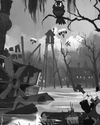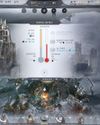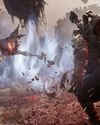
Though Steam is still the dominant retail force in PC gaming, the scene is starting to fragment. EA has Origin, Ubisoft has Uplay, Microsoft has an arcane catacomb of systems that loosely resembles a storefront, and with the arrival of the Epic Games Store, we’re opening more launchers than ever. At PC Gamer our taskbars are busy with quick-launch icons for different clients, and it’s enough to make us keen for the PC gaming equivalent of a universal remote— one client to rule them all. This is the problem that GOG has set out to solve with GOG Galaxy 2.0.
“We took a look at a couple of popular titles,” says designer Piotr Karwowski. “Fortnite, PUBG, Apex Legends, Overwatch, Rainbow Six: Siege, Destiny, Sea of Thieves, League of Legends, Dota, World of Tanks. We picked the ones that we believe are big, popular, there’s no scientific method behind this. We checked if you need a launcher to play those—and by the way, this is not the evilest example you can find, actually, we realized that for just those ten games you need eight different clients.
“I’m pretty sure that there are games where you need two different clients, because you buy a game on a platform, and the platform opens the client.” GOG Galaxy 2.0 has been in development for two years and hopes to serve as a master client that lets you quickly launch any game on your PC irrespective of the platform the game is tethered to. I watch as Karwowski signs into Battle.Net using Galaxy 2.0.
This story is from the {{IssueName}} edition of {{MagazineName}}.
Start your 7-day Magzter GOLD free trial to access thousands of curated premium stories, and 9,000+ magazines and newspapers.
Already a subscriber ? Sign In
This story is from the {{IssueName}} edition of {{MagazineName}}.
Start your 7-day Magzter GOLD free trial to access thousands of curated premium stories, and 9,000+ magazines and newspapers.
Already a subscriber? Sign In

"The War Within itself has kept me coming back most evenings too"
WORLD OF WARCRAFT remains my jailer, and I couldn't be more pleased about it

OK BUILDER
SATISFACTORY is the new titan in building and crafting games

HELL YES
DIABLO IV: VESSEL OF HATRED is a transformative expansion

MOUSE: PI FOR HIRE
This mouse wants to be more than just a gimmick

WINDBLOWN
Dead Cells dev's new roguelike has me afraid for my free time

NO MORE ROOM IN HELL 2
As the zombie horde surrounded me just moments after taking down my two remaining teammates, the writing was really on the wall. Armed with just a chef's knife, it was clear I stood no chance, but I was going down swinging, hoping for a miracle... it didn't come.

OWNED BY STEAM
VALVE cordially reminds you that your games aren't yours

CURSE OF THE AZURE BONDS
These classic games haven't aged badly, but I sure have.

DEEP FREEZE
Endure a blizzard of tough choices and rough consequences in FROSTPUNK 2

NEW HORIZONS
Building up REMNANT 2 outside the live service game grinder